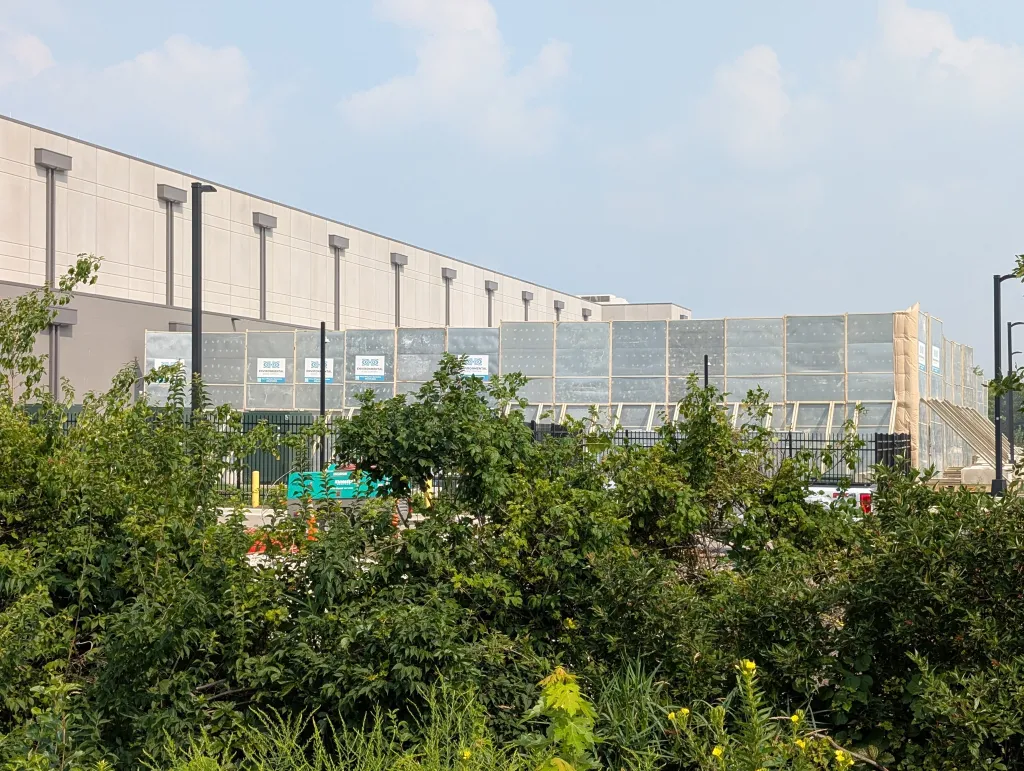
The Aurora City Council is set to discuss both a temporary moratorium on new data centers and warehouses as well as a voluntary reduction in force plan at a specially-called meeting on Thursday.
The special meeting, planned to take place after the Aurora City Council’s Finance Committee meeting at 3 p.m., was announced Tuesday afternoon just a few hours before the regularly-scheduled City Council meeting held that night.
At the Tuesday meeting, city staff made their case for a temporary moratorium on new data centers and warehouse development by citing an increased number of requests for these types of developments alongside residents’ concerns with existing data centers and warehouses.
Chief Development Services Officer John Curley told the Aurora City Council on Tuesday that the moratorium would allow staff time to research ways to mitigate the various impacts of data centers and warehouses then report recommendations back to City Council.
If approved by the Aurora City Council at the special meeting Thursday, the temporary moratorium would be in effect for 180 days, so until late March 2026, but could be extended an additional 30 days.
During that time, the city would not be accepting or approving applications for new data center or warehouse developments or expansions of existing facilities, according to a staff report about the proposal.
However, staff noted in the report several exemptions to the proposed moratorium, including projects with completed applications filed before the proposed ordinance goes into effect, routine maintenance or repairs at existing data centers that do not increase capacity and public safety or emergency facilities operated by government bodies.
If the temporary moratorium is put in place, there would still be a conditional processing of new applications for developers with time-sensitive projects, but those applications may need to be modified based on code changes that may eventually be passed by the Aurora City Council, Curley said during his presentation at Tuesday’s meeting.
There are currently five data center developments attempting to get approval, according to Curley. At the same time, staff is working to address residents’ concerns about existing facilities, which include concerns around noise, traffic and environmental impacts, he said.
The Beacon-News has previously reported on noise concerns raised by those living near the CyrusOne data center, located at the corner of Eola and Diehl roads on Aurora’s far East Side near Interstate 88.
Repairs made to that data center in April required the use of backup generators for many days straight, which caused consistently loud noise in the surrounding area that residents called “unlivable” and “horrible.” That prompted community meetings between residents, CyrusOne and city officials.
Since then, CyrusOne has put in place temporary measures and is working on permanent solutions to block sound coming from those generators as well as from rooftop chilling units that neighbors also say create noise pollution in the area. With the temporary measures up, residents have said recent repairs have been less impactful but that the generators were still so loud they could hear them inside their homes.
In addition to concerns around noise, data centers also take a large amount of electricity to operate, which is leading to higher energy costs, according to Aurora Director of Sustainability Alison Lindburg, who presented Tuesday alongside Curley.
A single data center building can use between 60 and 90 megawatts of power at its peak demand, which is more than the energy consumption of 15,000 households, Lindburg said during the presentation.
Another cited concern about data centers was around water. Not only are they large impervious surfaces that increase stormwater runoff and pollution, but also data centers with water-based cooling can use a lot of water, according to Lindburg’s presentation.
The Chicago Tribune recently highlighted a report warning that the Great Lakes region is not prepared for the growing demand for data centers and other water-heavy users. If not addressed, this could lead to shortages, according to the report.
Other environmental concerns from data centers include air quality, especially due to diesel-powered backup generators that can produce air pollutants, as well as greenhouse gas emissions, Lindburg’s presentation showed.
As for warehouses, traffic complaints have been brought by Aurora residents at several public forums, according to the presentation.
Lindburg said that the city of Aurora is not alone in its concerns or its challenges around warehouses and data centers, and that many communities have taken action to understand how to address the impact of these facilities.
Chicago is also studying data center noise and environmental impacts, and the findings of that study will be incorporated into the recommendations Aurora city staff eventually make, Lindburg said.
The ultimate goal of the proposed temporary moratorium is to clarify the data center and warehouse development process while making sure that long-term community and environmental impacts are addressed before construction, according to staff’s presentation Tuesday.
Longtime Aurora City Council member Ald. Michael Saville, 6th Ward, said the council has done temporary moratoriums in years past, though not very often.
“We felt that development was getting ahead of our ordinances’ standards, and we wanted to make sure that we had up-to-date ordinances,” he said.
Ald. Shweta Baid, 10th Ward, said it is very important to understand current data center issues in Aurora, which mirror what many other communities are facing across the country.
The city needs to take steps in regulating noise, zoning, equipment placement and pre- and post-construction testing, plus should put in place a temporary moratorium if needed, to make sure data center growth does not come at the expense of the community’s health, environment and peace, she said.
Also to be discussed and possibly voted on at Thursday’s specially-called Aurora City Council meeting is the “2025 Voluntary Reduction In Force Incentive Plan.”
The plan looks to reduce the city’s anticipated budget deficit, previously estimated at around $30 million for 2026, and minimize potential layoffs by offering additional severance pay and benefits to eligible employees who agree to leave employment with the city, according to a staff report.
Aurora faced a general fund shortfall in 2011 and at that time adopted a version of this plan to reduce staffing, the report said.
Neither the temporary moratorium on data centers and warehouses nor the voluntary reduction in force plan went through the typical approval process. They appear to have skipped the Aurora City Council’s committee structure and are set to come directly before the council for final approval at the specially-called meeting Thursday.
rsmith@chicagotribune.com



